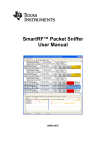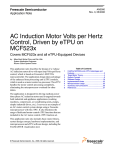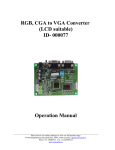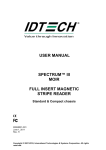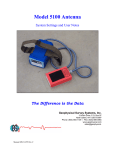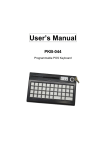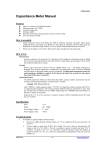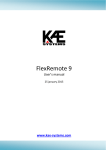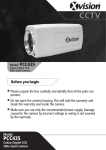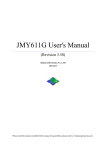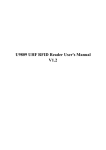Download BLE 4.0 Module ZBModule User Manual
Transcript
BLE 4.0 Module ZBModule User Manual 1 / 15 Bluetooth 4.0 BLE Introduction With only a ZBmodule module, you can make your products easily and conveniently interactive connect with the iPad, iPhone and Android phones with Bluetooth 4.0 . ZBmodule Bluetooth 4.0 BLE module uses TI CC2540 chip, and is compatible with world-wide radio frequency regulation system: ETSI EN 300 328 and EN 300 440 2 class (Europe), FCC CFR47 15 parts (USA) , and ARIB STD-T66 (Japan) . ZBmodule can be used in many different areas: Consumer Medical Electronics Appliances intelligent control Remote control toy Sensor Data Acquisition Anti-lost alarm Wireless keyboard, mouse Remote control car Lighting control 2 / 15 Simple transparent communication ZBmodule Bluetooth 4.0 BLE module communicates with the MCU through the serial port in transparent communication mode. It is very easy to communicate with the MCU , you no longer need to worry about the development of the Bluetooth protocol stack . Flexible peripheral interface In addition to implementing a simple transparent communication protocol outside, ZBmodule module also has flexible peripheral interfaces; Through a special instruction, the APPs can dynamically change the mode on the IO port functionality, with ADC, PWM, IO, and UART interfaces. 3 / 15 Specifications of ZBmodule module: Working frequency 2.4 GHz (2402 MHZ to 2480 MHZ); GFSK modulation mode; Transmitting power: 0 dBm to - 23 dBm; Receiving sensitivity - 93 DBM (1 MBPS); 1 MBPS transmission rate maximum; Minimum working voltage of 2.0 V. Working voltage of 3.6 V. 19.6 mA in working mode; Standby current is less than 1 uA; Maximum current is 20 mA (sending data - 6 DBM); Range of remote control: line-of-sight communication range is 25 meters; Module size: 26.7 mm * 18.3 mm * 8.8 mm; PCB antenna/external antenna; Upgrade firmware through a serial port; 4 / 15 Pin Layout and Outline of ZB Module PIN# 1 2 3 4 5 6 7 8 9 10 11 12 13 14 15 16 17 18 19 20 NAME GND VCC RES DC DD PWR_EN UART_RX UART_TX NC GND DP DN VBUS NC IO IO IO PAIR LED PWM4/SPI_NREAD 21 PWM3/SPI_CLK 22 PWM2/SPI_NSS 23 PWM1/SPI_MOSI 24 ADC/SPI_MISO 25 26 ADC ADC Description Ground 3.3V Reset, Active Low Debug Port Debug Port Awake, Active on Falling edge RX of UART TX of UART Not connected Ground USB port USB port USB port Not connected Digital output (0V/3.3V) Digital output (0V/3.3V) Digital output (0V/3.3V) Pair button, active low Status LED PWM with adjustable frequency and duty cycle or SPI interface PWM with adjustable frequency and duty cycle or SPI interface PWM with adjustable frequency and duty cycle or SPI interface PWM with adjustable frequency and duty cycle or SPI interface PWM with adjustable frequency and duty cycle or SPI interface Analog Input (0-3.3V) Analog Input (0-3.3V) 5 / 15 Note: 1. Default baud rate: 9600bps, 8N1 2. PWM 1 and PWM 2 are with the same frequency, but the duty cycle can be different. Serial Protocol of ZBModule 1.1 Frame structure The serial protocol of ZBmodule is used to provide a communication between device (which is Arduino) and the ZBmodule. There are two different communication modes of the protocol: transparent communication mode and AT mode. Transparent mode: The size of the frame is 20 bytes (the first byte cannot be 0xA5). AT mode: There are 4 areas, preamble, length, payload, and CRC. It can be shown below: Segment Byte Preamble (code) 2 Length (LEN) 1 Payload (PayLoad) N CRC (CHS) 1 Postamble (End) 1 Preamble (code): 0xA5 0xA2 Length (LEN): Max 20 bytes Payload: the content of the package Postamble (End): 0x5A CRC: CHS= (PayLoad[0]+…+ PayLoad[n-1])&0xFF; 1.2 Serial AT command: 0x00: Test Command When receive this command, the module will reply with: “Device CMD OK” Example: 0xA5 0xA2 0x01 0x00 0x00 6 / 15 0x5A 0x02: Serial baud rate configuration When receive this command, if successfully, the module will acknowledge with: “Change Baud to XXX OK”. Otherwise, it will reply with:” Error Baud Set Option From 0x00 to 0x05”. Sample command to set baud rate to 9600bps, 8N1: 0xA5 0xA2 0x02 0x02 0x00 0x02 0x5A 0x03 0x5A There are 5 settings: 0x00 9600bps, 8N1 0x01 19200bps, 8N1 0x02 38400bps, 8N1 0x03 57600bps, 8N1 0x04 115200bps, 8N1 0x03: Reset the module When receive this command, the module will reply with: “Reset after 1000ms …” Example: 0xA5 0xA2 0x02 0x03 0x04: Configure the pairing status of the module When receive this command, the module will reply with: “Pair Permit =False” or “Pair Permit =True”. 7 / 15 Example: 0xA5 0xA2 0x02 0x04 0x00 or 0x01 0x04 or 0x05 0x5A When set with 0x00, the module will be in a pair non-permit state. When set with 0x01, the module will be in a pair permit state. 0x05: Disconnect the module When receive this command, the module will reply with: “Pair Permit =False” or “Pair Permit =True”. Example: 0xA5 0xA2 0x02 0x04 0x00 or 0x01 0x04 or 0x05 0x5A When set with 0x00, the module will be in a pair non-permit state. When set with 0x01, the module will be in a pair permit state. 0x06: RSSI Detection This command is used to detect the signal strength (It can be used to measure the distance). Example: 0xA5 0xA2 0x02 0x06 0x06 It will reply with: @Rssi_Value: “@-60”. 8 / 15 0x5A BLE Protocol 2.1 BLE Frame structure The BLE protocol is used to establish the communication between devices such as iPhone to the ZBmodule. There are two different communication modes of the protocol: transparent communication mode and AT mode. Transparent mode: The size of the frame is 20 bytes (the first byte cannot be 0xA5). AT mode: There are 4 areas, preamble, length, payload, and CRC. It can be shown below: Segment Byte Preamble (code) 2 Length (LEN) 1 Payload (PayLoad) N CRC (CHS) 1 Postamble (End) 1 Preamble (code): 0xA5 0xA3 Length (LEN): Max 20 bytes Payload: the content of the package Postamble (End): 0x5A CRC: CHS= (PayLoad[0]+…+ PayLoad[n-1])&0xFF; 0x00: Reset Module When the remote device such as iPhone sends this command to the module, the module will automatically terminate the connection with the remote device. Example: 0xA5 0xA3 0x01 0x00 0x00 0x5A 0x01: Set Frequency of PWM The remote device such as iPhone can use this command to configure the output frequency of the ZBmodule PWMs (The default PWM frequency is 1K Hz.) 9 / 15 0xA5 0xA3 0x05 0x01 PWMF_1 PWMF_2 PWMF_3 PWMF_4 0xXX 0x5A PWM_FREQ=PWMF_1 <<24 | PWMF_2<<16 | PWMF_3 <<8 | PWMF_4; These two bytes form the value of the frequency. Example: 0xA5 0xA3 0x05 0x01 0x00 0x04 0x93 0xE0 0x78 0x5A The frequency of the PWM is configured to be 300k (0x000494e0). 0x02: Set Duty Cycle of PWM The remote device such as iPhone can use this command to configure the duty cycle of PWM of the ZBmodule. The range of the duty cycle is 1% - 99%. 0xA5 0xA3 0x03 0x02 PWM_CH PWM_DUTY 0xXX 0x5A 0x48 0x5A PWM_CH (1<=PWM_CH<=4) is the channel number of the PWM. PWM_DUTY (1<=PWMOCCUPT<=99) is the duty cycle. Example: 0xA5 0xA3 0x03 0x02 0x02 0x44 The above command will configure the duty cycle of the PWM channel No. 2 to be 68%. 0x03: Set Status of GPIO Channel The remote device such as iPhone can use this command to set the status of GPIO channel. 0xA5 0xA3 0x03 0x03 GPIO_CH GPIO_STATUS 0xXX 0x5A GPIO_CH (1<=GPIO_CH <=4) is the channel number of GPIO. GPIO_STATUS : 0 means low level output, and 1 means high level output. 10 / 15 Example: 0xA5 0xA3 0x03 0x03 0x02 0x01 0x06 0x5A The above command will set the GPIO channel 2 to output high level. 0x04: Read Voltage of AIO The remote device such as iPhone can use this command to read the voltage of AIO channel. 0xA5 0xA3 0x02 0x04 AIO_CH 0xXX 0x5A AIO_CH (1<=AIO_CH<=3 ) is the ADC channel number. 0x0C: Configure the baud rate of the serial port This command is similar to the serial interface command except that this command is used to remotely configure the serial port of the ZBmodule from the remote device such as iPhone. Command: 0xA5 0xA3 0x02 0x0C BAUD 0xXX BAUD is the serial port setting. There are 5 baud rate settings: 0x00 9600bps, 8N1 0x01 19200bps, 8N1 0x02 38400bps, 8N1 0x03 57600bps, 8N1 0x04 115200bps, 8N1 Example: 11 / 15 0x5A 0xA5 0xA3 0x02 0x0C 0x00 0x02 0x5A This command configures the serial port to be 9600bps, 8N1. 0x0f: Query the baud rate of the serial port This command is similar to the serial interface command except that this command is used to remotely query the serial port of the ZBmodule from the remote device such as iPhone. Command: 0xA5 0xA3 0x01 0x0f 0x0f 0x5A This command is used to query the setting of the serial port, and the results will be sent to the remote device such as iPhone after 200ms. 0xA5 0xB3 0x02 0x0f BAUD 0xXX 0x5A BAUD is the baud rate. There are 5 setting: 0x00 9600bps, 8N1 0x01 19200bps, 8N1 0x02 38400bps, 8N1 0x03 57600bps, 8N1 0x04 115200bps, 8N1 0x0d: Save the current setting of GPIO This command is used remotely to save the current setting of GPIO, so that the GPIO status can be restored after power cycle. This function is mainly useful for lighting control. 12 / 15 Example: 0xA5 0xA3 0x01 0x0d 0x0d 0x5A 0x0e: Save the current setting of PWM This command is used remotely to save the current setting of PWM, so that the PWM status can be restored after power cycle. One typical application of this function is the RGB control of LEDs. Example: 0xA5 0xA3 0x01 0x0e 0x0e 0x5A 0x10: Clear the settings of the ZBmodule (including serial port setting, PWM setting, GPIO setting) Example: 0xA5 0xA3 0x01 0x10 0x10 0x5A After this command is executed, the serial port is restored to be 9600bps, 8N1. GPIOs will be all low level, and duty cycle of PWM will be 0 (i.e, no output). Complementary Commands: 0x05: Control 4 PWMS at the same time 0xA5 0xA3 0x06 0x05 CHMsk CH1_Duty CH2_Duty CH3_Cuty CH4_Duty CHMsk is the mask of the PWM channels. We can define multiple channel outputs by output=Ch1|Ch2|Ch3|Ch4. Ch1: 0x01 Ch2: 0x02 Ch3: 0x04 13 / 15 0xXX 0x5A Ch4: 0x08 Example: Set No.1, No.2 and No.4 of PWM to have a duty cycle of 20%, 30%, and 40%. 0xA5 0xA3 0x06 0x05 0x0B 0x14 0x1E 0x00 0x28 0x6A 0x5A 0xXX 0x5A 0x06: Control 4 GPIOs at the same time 0xA5 0xA3 0x06 0x06 IOMask GPIO1_Status GPIO2_Status GPIO3_Status GPIO4_Status IOMask is the mask of the GPIO channels. We can define multiple channel outputs by output=GPIO1| GPIO2| GPIO3| GPIO4. GPIO1: 0x01 GPIO2: 0x02 GPIO3:0x04 GPIO4:0x08 Example: Set No.1, No.2 and No.4 of GPIOs to be high level. 0xA5 0xA3 0x06 0x06 0x0B 0x01 0x01 0x00 0x01 0x14 0x5A The above two commands can be used with the commands saving the status of PWMs and GPIOs. It can be used to control LED or servo. 14 / 15 15 / 15















